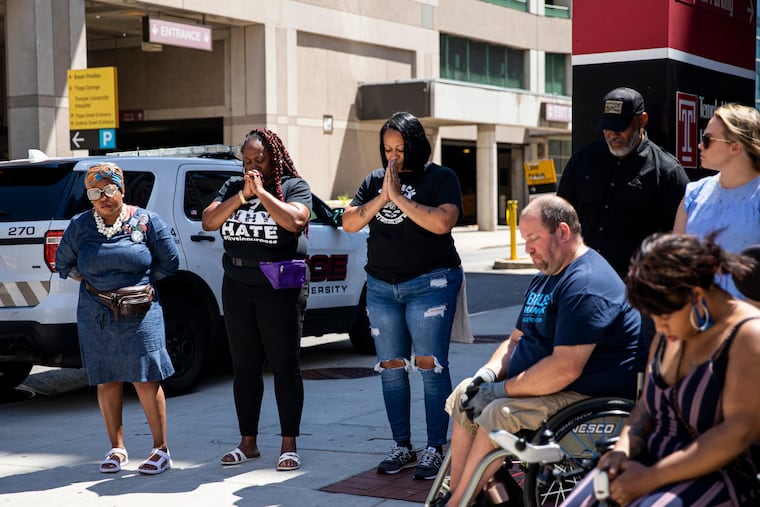Hours after a pregnant woman was fatally shot in Philly, groups gathered to protest gun violence and raise awareness about infant and maternal health.
The fatal shooting of a pregnant woman in Philadelphia early Saturday morning is a collision of two of the city's greatest public health challenges: maternal mortality and gun violence.

A woman who was 34 weeks pregnant was fatally shot in the head in Philadelphia’s Port Richmond neighborhood early Saturday morning. Doctors at Temple University Hospital were able to deliver the baby, who was reported in stable condition.
As Temple medical staff tended to the baby, activists and shooting survivors gathered outside the hospital to call for an end to gun violence. And across town, hundreds of people flocked to the grounds of the Please Touch Museum for a March of Dimes event raising awareness about infant and maternal mortality.
The shooting and the events coincidentally scheduled for Saturday represent a collision of two of Philadelphia’s greatest public health challenges — maternal mortality and gun violence.
“It shows how many basic elements of society have begun to fall apart,” said City Councilmember Helen Gym, as she marched with shooting survivors and activists along Broad Street from Temple Hospital to a community park a few blocks away. “The level of inhumanity happening right now needs to be brought back by restoring a sense of community.”
In addition to stronger gun-control laws and more funding for support services, communities need more resources for people who are at risk of becoming victims of gun violence, said City Councilmember Kendra Brooks, who organized the rally outside Temple and a resource fair at Butcher’s Triangle, where employers, housing organizations, and early intervention programs for teens and kids set up booths with information.
Too often, Brooks said, response to gun violence focuses exclusively on victims.
“We need more support for people before it gets to that point,” she said.
A rise in the number of women, teenagers, and children being shot is an alarming sign of how serious the city’s gun violence problem has become, Gym said.
Shootings in Philadelphia again are on an alarming track, with about 930 shootings reported so far this year, up from about 870 this time last year. Just during the Memorial Day weekend, 44 people were shot, 15 fatally — including a 10-year-old boy and 16-year-old girl.
The Saturday morning shooting occurred near the intersection of Richmond Street and Wheatsheaf Lane. The woman, who was in her 20s, was pronounced dead just before 2 a.m. at Temple. Police have not released her name.
It is at least the third fatal shooting in the region of a pregnant woman since last fall. Last Sunday, a Coatesville man was charged with murder for allegedly killing his girlfriend and their unborn child, along with another woman, in what the Chester County district attorney said was a domestic dispute. And last November, a 32-year-old woman who was seven months pregnant was fatally shot in Philadelphia’s Crescentville section as she unloaded baby shower gifts from her vehicle in what police said they believed was a targeted attack. No arrests have been made in that case.
While fatal shootings of pregnant women are still uncommon, myriad other health threats present a significant risk of death for pregnant people in Philadelphia — particularly in Black communities. That was the focus of the March of Dimes event Saturday morning.
Philadelphia had a maternal mortality rate of 20 deaths per 100,000 births between 2013 and 2018 — outpacing the national rate of 17.4 deaths per 100,000 births — according to a 2021 report by the Philadelphia Maternal Mortality Review Committee. The committee reviews all deaths among pregnant people in an effort to better target improvement initiatives. Black individuals accounted for 73% of pregnancy-related deaths during that period, but just 43% of births.
In its annual infant and maternal-health report card, the March of Dimes gave Philadelphia a grade of D-minus for its preterm birth rate of 11.4.%. The national average is 10.1%. The statewide rate for Pennsylvania was 9.6%, and for New Jersey, 9.3%, for a grade of C+ for each, according to the report.
Premature birth is a leading cause of infant death and is most common among pregnant people who did not receive adequate prenatal care, which is why it is an important measure of infant and maternal health, said Allison Lang, executive director of March of Dimes’ Philadelphia/South Jersey chapter.
“In Philadelphia we’re known for meds and eds, but we have a significant number of community members who don’t have access to health care,” Lang said.
The organization’s March for Babies aims to raise awareness about the risks of preterm birth and the need for more prenatal support.
Elsewhere in Philadelphia, it was a bullet that threatened a birth. As of Saturday afternoon, police had not made any arrests or recovered a weapon in the death of the pregnant woman killed in Port Richmond.
The intersection where the shooting occurred is marked by weedy lots, strewn trash, and discarded car tires, the only major landmark the imposing brick-and-iron gates of the city Northeast Water Pollution Control Plant. Traffic roars overhead on I-95, and well-tended houses stand to the north and south.
The intersection itself is busy with passing cars but deserted of people save for those walking to nearby shopping centers or waiting for rides. On Saturday, there was no sign that a woman had lost her life there.
Police did not release details about who would be given guardianship of the newborn.
“It’s another child who will live with the consequences of gun violence their entire life,” Gym said. “We have to, as a community, be there for these children. We cannot let them down.”
Staff writer Jeff Gammage contributed to this article.